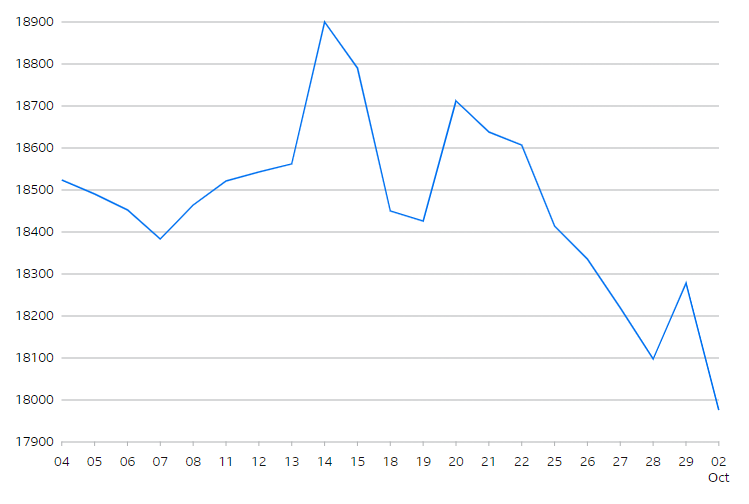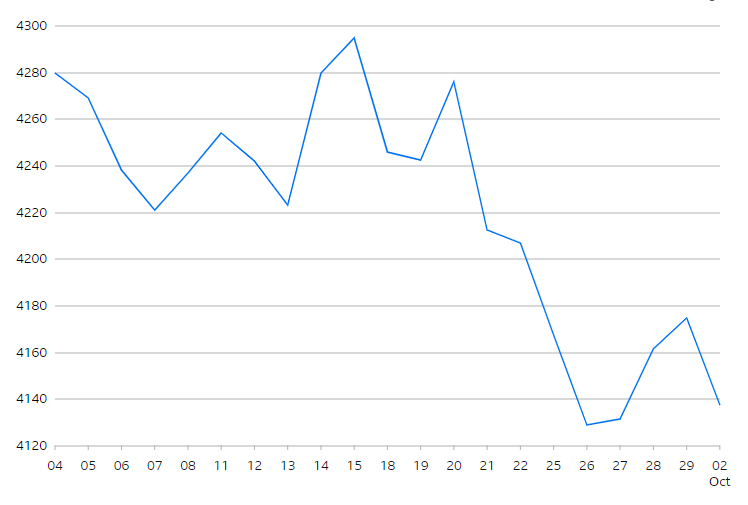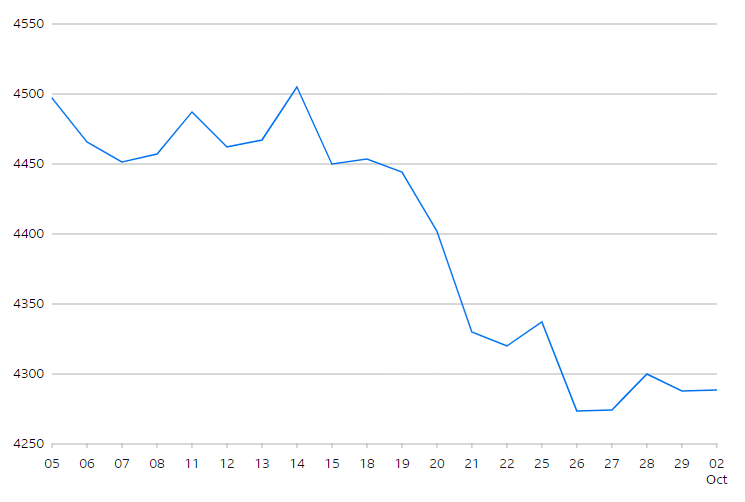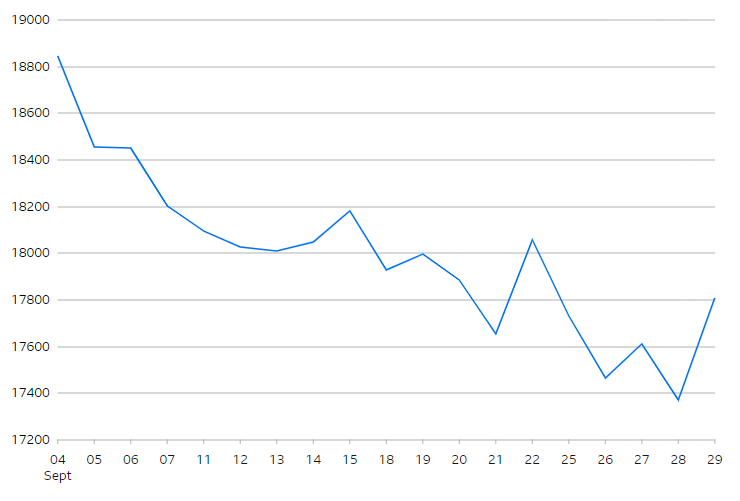
This is part of our monthly pension update series. Catch up on last month’s summary here: What happened to pensions in August 2023?
It’s a time of transition, both in nature and the financial landscape. One positive development is that food prices fell for the first time in two years in September. This is welcome relief for families and businesses that have been struggling with the rising cost of living.
However, there are also some concerns, such as the possibility of ‘stagflation’ in the UK economy. Stagflation is a period of high inflation and low economic growth. It can be a difficult time for businesses, as they may have to raise prices to cover their costs, but consumers may have less disposable income to spend.
Read on to discover how markets have performed this month and whether the UK economy’s on course for stagflation.
What happened to stock markets?
In UK stock markets, the FTSE 250 Index fell by almost 2% in September. This brings the year-to-date performance close to -3%.
 Source: BBC Market Data
Source: BBC Market Data
In European stock markets, the EuroStoxx 50 Index fell by almost 3% in September. This brings the year-to-date performance close to +10%.
 Source: BBC Market Data
Source: BBC Market Data
In US stock markets, the S&P 500 Index fell by 5% in September. This brings the year-to-date performance close to +12%.
 Source: BBC Market Data
Source: BBC Market Data
In Asian stock markets, the Hang Seng Index fell by almost 4% in September. This brings the year-to-date performance close to -10%.
 Source: BBC Market Data
Source: BBC Market Data
Is the UK economy being squeezed?
The UK economy has been struggling under the weight of high inflation, rising energy prices, and supply chain disruptions. These factors are squeezing businesses and consumers, and raising fears of a recession. But does this spell an incoming period of stagflation?
What is economic stagnation?
Gross Domestic Product (GDP) is the value of all goods and services made in a country, usually calculated annually or every three months. It’s commonly used to estimate a country’s economic health, as either growing or shrinking in value. To measure economic growth, GDP is compared to previous levels of trade.
Economic stagnation is a period of slow or no economic growth. This can lead to high unemployment, low wages, and a decline in living standards. Economists generally consider a GDP growth rate of less than 2-3% annually to be stagnant.
An economic cycle is the fluctuation between periods of expansion (recovery) and contraction (recession) of an economy. To prevent stagnation during economic cycles, policymakers may tighten monetary policies.
What is high inflation?
Inflation’s the general increase in the price of goods over time. It is measured as a percentage change in The Consumer Prices Index (CPI), which is a basket of commonly purchased items or services. High inflation affects the affordability of these goods for households.
The Bank of England is the central bank of the UK. It is responsible for setting monetary policy, which is the use of interest rates and other tools to influence the economy. The government has tasked the Bank of England to keep inflation at around 2% per year.
What are the signs of stagflation in the UK economy?
Stagflation is a situation where an economy is stagnant (not growing) paired with high inflation (rising prices). This is a problem because it makes it difficult for people to make ends meet. When prices are rising and the economy isn’t growing, people have less money to spend on essentials. So how is the UK economy performing?
Is the UK headed for stagflation this autumn?
The UK’s economy is weak, inflation is over three times the Bank of England’s target, and unemployment is rising. These factors suggest the UK may risk stagflation.
- Economic stagnation: A GDP growth rate of less than 2-3% annually is considered stagnant. In Q2 2023 the UK’s GDP increased by 2.5%, an improvement from 1.4% economic growth in Q2 2022.
- High inflation: The Bank of England has a 2% inflation target. The UK’s current rate of inflation has fallen to 6.7% in the 12 months to August 2023.
- Rising unemployment: Experts suggest a healthy economy maintains an unemployment rate between 3-5%. In Q2 2023 the UK’s unemployment had risen to 4.2%, an upswing from a 3.8% unemployment rate in Q2 2022.
The UK’s economy is growing marginally and the Bank of England is raising interest rates to combat inflation. These factors suggest the UK may avoid stagflation.
- No recession: Currently, the UK economy ranks sixth in the world by GDP. A recession is defined as two consecutive quarters of negative economic growth. As the UK economy hasn’t contracted, it’s not currently in a recession.
- Interest rates: The Bank of England has raised interest rates 14 times over two years in an effort to combat inflation. Already there’s been a significant drop in the rate of inflation from the 41-year high of 11.1% in October 2022.
It’s too early to say for sure whether or not the UK will enter a period of stagflation. However, the Bank of England’s actions will be crucial in determining the outcome.
This is part of our monthly pension update series. Check out the next month’s summary here: What happened to pensions in October 2023?
Have a question? Get in touch!
You can check out our Plans page to learn how your money is invested in different assets and locations. You can always send comments and questions to our team via engagement@pensionbee.com.
Risk warning
As always with investments, your capital is at risk. The value of your investment can go down as well as up, and you may get back less than you invest. This information should not be regarded as financial advice.




